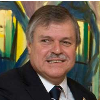Officials
Offical

The South American nation of Uruguay, officially called the Oriental Republic of Uruguay, sent a new ambassador to Washington in September 2012, a physician who served 20 years as a national legislator. Succeeding Carlos Gianelli, who served from 2005 to 2012, Carlos Pita Alvarez presented his diplomatic credentials to President Obama on September 19, 2012.
Born in Montevideo in 1951, the son of Américo Pita Parodi, Carlos Pita Alvariza earned his medical degree from the Faculty of Medicine at the University of the Republic in Montevideo, where he was a leader of the Student Association of Medicine and the Federation of University Students of Uruguay. He later earned a Certificate of International Relations at the University Alberto Hurtado in Santiago, Chile.
He began his political activism in 1968, a year of mass popular protests worldwide, supporting Uruguay’s National Party, although normal politics was largely suspended when President Jorge Pacheco declared a state of emergency in 1968, followed by an additional suspension of civil liberties in 1972 and a military coup d’état in 1973.
During the years of the military dictatorship from 1973 to 1984, when many Uruguayans were tortured or “disappeared,” Pita joined in forming the opposition group Popular Nationalist Current. During the 1984 restoration of democracy, Pita was elected to Uruguay’s national legislature, called the Chamber of Deputies, for Montevideo on the minor party list “Movement for the Fatherland,” part of the right of center coalition known as the National Party.
When the National Party pushed through a 1986 amnesty law protecting officials who participated in torture and murder under the military regime, however, Pita formed the People’s Current and joined the Frente Amplio (Broad Front), Uruguay’s left of center political coalition. He was reelected three times, in 1989, 1994 and 1999, always as part of the Broad Front.
In the Chamber, Pita served as head of several special committees, including ones on labor legislation, on the assassinations of deputies Héctor Gutiérrez Ruiz and Zelmar Michelini, and on amnesty for political prisoners. In 2002, he was also president of the Committee on International Affairs, of which he’d been a member for fourteen years.
After leaving the Chamber of Deputies in 2004, Pita was named ambassador to Chile, where he served from 2005 to 2010. In January 2011, Pita began service as ambassador to Spain.
He is married to Mariella Mora, and they have four daughters.
-Matt Bewig
- Latest News
- D.C. Public Schools will Teach all Second-Graders to Ride a Bike
- New Rule in Germany Limits Sales of Sex-Themed E-Books to 10pm to 6am
- What Happened to the 6-Year-Old Tibetan Boy the Chinese Government Kidnapped 20 Years Ago?
- U.S. Ambassador to Turkey Photoshops his Hair Color to Mock Turkish Mayor
- Mystery Artist Calls Attention to Unfixed Potholes by Drawing Penises around Them




